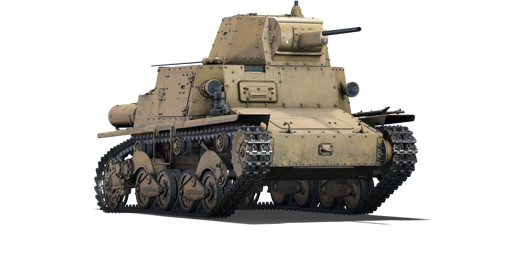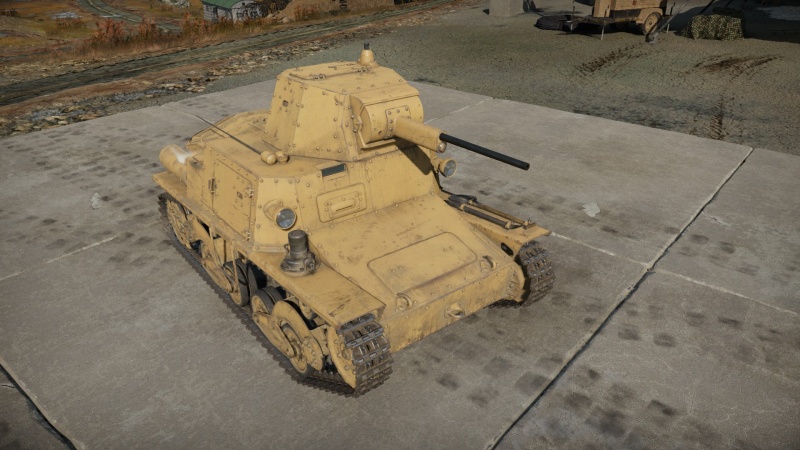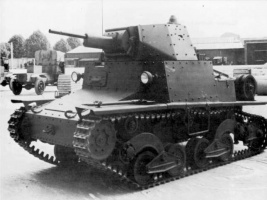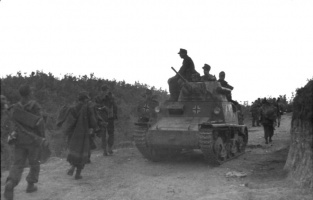Difference between revisions of "L6/40"
Inceptor57 (talk | contribs) (→History: Added historical photos) |
|||
| Line 184: | Line 184: | ||
== History == | == History == | ||
<!-- ''Describe the history of the creation and combat usage of the vehicle in more detail than in the introduction. If the historical reference turns out to be too long, take it to a separate article, taking a link to the article about the vehicle and adding a block "/History" (example: <nowiki>https://wiki.warthunder.com/(Vehicle-name)/History</nowiki>) and add a link to it here using the <code>main</code> template. Be sure to reference text and sources by using <code><nowiki><ref></ref></nowiki></code>, as well as adding them at the end of the article with <code><nowiki><references /></nowiki></code>. This section may also include the vehicle's dev blog entry (if applicable) and the in-game encyclopedia description (under <code><nowiki>=== In-game description ===</nowiki></code>, also if applicable).'' --> | <!-- ''Describe the history of the creation and combat usage of the vehicle in more detail than in the introduction. If the historical reference turns out to be too long, take it to a separate article, taking a link to the article about the vehicle and adding a block "/History" (example: <nowiki>https://wiki.warthunder.com/(Vehicle-name)/History</nowiki>) and add a link to it here using the <code>main</code> template. Be sure to reference text and sources by using <code><nowiki><ref></ref></nowiki></code>, as well as adding them at the end of the article with <code><nowiki><references /></nowiki></code>. This section may also include the vehicle's dev blog entry (if applicable) and the in-game encyclopedia description (under <code><nowiki>=== In-game description ===</nowiki></code>, also if applicable).'' --> | ||
| − | + | [[File:Fiat-Ansaldo L6 40.jpg|x200px|left|thumb|none|A Fiat-Ansaldo L6/40.]] | |
The L6/40 was designed to replace the L3 tankette in the cavalry and reconnaissance roles. It was based on a heavily modified L3 chassis, keeping the two-person crew, but with increased firepower, protection and mobility. By the time it was accepted for service in early 1940, it was already only barely adequate as a recon tank. By the time it entered general service in 1942 it was hopelessly obsolete. After 283 had been built it was cancelled in favour of the Semovente 47/32. A flamethrower version was developed but did not enter service. | The L6/40 was designed to replace the L3 tankette in the cavalry and reconnaissance roles. It was based on a heavily modified L3 chassis, keeping the two-person crew, but with increased firepower, protection and mobility. By the time it was accepted for service in early 1940, it was already only barely adequate as a recon tank. By the time it entered general service in 1942 it was hopelessly obsolete. After 283 had been built it was cancelled in favour of the Semovente 47/32. A flamethrower version was developed but did not enter service. | ||
| + | [[File:German Beutepanzer L6-40 tank (Bundesarchiv Bild 101I-203-1680-14A).jpg|right|thumb|none|x200px|A L6/40 in German service.]] | ||
L6/40 was to be used in the Raggruppamento Esplorante Corazzato (RECo); the divisional-level armoured reconnaissance task forces found in the order of battle of armoured and motorized divisions, and in several independent recon units, deployed in 4-car platoons. In total, 72 were sent to North Africa, and 55 went to Russia on March 1942, where they equipped the 67th Battaglione Motocorazzato Bersaglieri (lightly armoured battalion) in the 3rd Celere (Cavalry) Division. They were the heaviest Italian tanks used on that front. The battalion was destroyed in December 1942 during fighting on the Don River. L6/40 was also employed in Yugoslavia, by the San Guisto light armoured squadron-group of the 1st Celere Division. | L6/40 was to be used in the Raggruppamento Esplorante Corazzato (RECo); the divisional-level armoured reconnaissance task forces found in the order of battle of armoured and motorized divisions, and in several independent recon units, deployed in 4-car platoons. In total, 72 were sent to North Africa, and 55 went to Russia on March 1942, where they equipped the 67th Battaglione Motocorazzato Bersaglieri (lightly armoured battalion) in the 3rd Celere (Cavalry) Division. They were the heaviest Italian tanks used on that front. The battalion was destroyed in December 1942 during fighting on the Don River. L6/40 was also employed in Yugoslavia, by the San Guisto light armoured squadron-group of the 1st Celere Division. | ||
Revision as of 23:11, 7 January 2022
Contents
Description
The Carro Armato modello L6 (shortened to L6/40) is a rank I Italian light tank with a battle rating of 1.0 (AB/RB/SB). It was introduced in Update 1.85 "Supersonic".
General info
Survivability and armour
Armour type:
- Rolled homogeneous armour (hull, turret, gun mantlet)
- Cast homogeneous armour (hull rear: centre housing)
| Armour | Front (Slope angle) | Sides | Rear | Roof |
|---|---|---|---|---|
| Hull | 30 mm (11°) Upper plate 15-20 mm (75°) Upper glacis 30 mm (6°) Lower plate 15 mm (70°) Lower glacis |
15 mm | 15 mm | 15-20 mm (15°) Upper glacis 10 mm Centre section 10 mm (20°) Rear section |
| Turret | 25 mm (cylindrical) Turret front 30 mm Gun mantlet 40 mm (12°) Turret frame |
15 mm (20°) | 25 mm (16°) Hatch 15 mm (16°) |
10 mm |
Notes:
- Suspension wheels and tracks are 15 mm thick while bogies are 10 mm thick.
- Mudguards are 5 mm thick.
Mobility
| Game Mode | Max Speed (km/h) | Weight (tons) | Engine power (horsepower) | Power-to-weight ratio (hp/ton) | |||
|---|---|---|---|---|---|---|---|
| Forward | Reverse | Stock | Upgraded | Stock | Upgraded | ||
| Arcade | 47 | 8 | 6.8 | 105 | 130 | 15.44 | 19.12 |
| Realistic | 43 | 7 | 60 | 68 | 8.82 | 10 | |
Modifications and economy
Armaments
Main armament
| 20 mm Breda Mod.35 | Turret rotation speed (°/s) | Reloading rate (seconds) | ||||||||||||
|---|---|---|---|---|---|---|---|---|---|---|---|---|---|---|
| Mode | Capacity (Belt) | Fire rate | Vertical | Horizontal | Stabilizer | Stock | Upgraded | Full | Expert | Aced | Stock | Full | Expert | Aced |
| Arcade | 280 (8) | 240 | -12°/+20° | ±180° | N/A | 22.8 | 31.6 | 38.4 | 42.5 | 45.2 | 7.80 | 6.90 | 6.36 | 6.00 |
| Realistic | 14.3 | 16.8 | 20.4 | 22.6 | 24.0 | |||||||||
Ammunition
- Default: API-T · HEFI-T* - This belt can be used for both roles: anti-aircraft and against lightly armoured vehicles to the detriment of a reduced rate of fire. Half the belt is composed of high-explosive fragmentation incendiary shells that will do negligible damage against armoured targets but will prove deadly against aircraft and vehicles with exposed crew
- Perforante mod.35: API-T - Intermediate belt to be used against light tanks and other vehicles from the rear. Adequate until the better PzGr 40 can be used.
- PzGr 40: HVAP-T · API-T - Highest penetrating belt, designed to deal with armoured targets . However, the penetration is very poor beyond 500 m. In close combat, aiming for modules and crew member is advised as the post-penetration damage is limited. Its effect against angled armour is limited due to the nature of the HVAP shells, but the penetration power compensates such drawback.
| Penetration statistics | ||||||
|---|---|---|---|---|---|---|
| Belt | Penetration @ 0° Angle of Attack (mm) | |||||
| 10 m | 100 m | 500 m | 1,000 m | 1,500 m | 2,000 m | |
| Default | 38 | 36 | 27 | 19 | 14 | 10 |
| Perforante mod.35 | 38 | 36 | 27 | 19 | 14 | 10 |
| PzGr 40 | 64 | 63 | 27 | 19 | 14 | 10 |
| Belt details | |||||||||
|---|---|---|---|---|---|---|---|---|---|
| Belt | Type of warhead |
Velocity (m/s) |
Projectile Mass (kg) |
Fuse delay (m) |
Fuse sensitivity (mm) |
Explosive Mass (TNT equivalent) (g) |
Ricochet | ||
| 0% | 50% | 100% | |||||||
| Perforante mod.35 | API-T | 832 | 0.14 | 1.2 | 9 | 1.7 | 47° | 60° | 65° |
Ammo racks
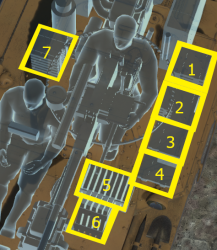
| Full ammo |
1st rack empty |
2nd rack empty |
3rd rack empty |
4th rack empty |
5th rack empty |
6th rack empty |
7th rack empty |
Visual discrepancy |
|---|---|---|---|---|---|---|---|---|
| 35 | 29 (+6) | 24 (+11) | 23 (+12) | 22 (+13) | 13 (+22) | 8 (+27) | 1 (+34) | No |
Notes:
- Ammunition is modeled as clips of 8 rounds.
- Clips disappear after having been shot/loaded.
Machine guns
| 8 mm Breda Mod. 38 | ||||
|---|---|---|---|---|
| Mount | Capacity (Belt) | Fire rate | Vertical | Horizontal |
| Coaxial | 1,524 (24) | 600 | N/A | N/A |
The small calibre of the Breda Mod. 38 machine gun makes it largely ineffective against all armoured vehicles but the ones with an open compartment. It still can be used to ping targets as a rangefinding help or to mow down minor obstacles blocking the cannon's line of sight.
Usage in battles
- Combat tactics
The L6/40 possesses a level of versatility which allows it to play in a variety of roles with varying efficiency. As a frontline tank, one must maintain a short engagement distance (up to 200 m if possible) and exploit its small size to hide in almost all types of cover. The autocannon's efficiency will allow the player to dispatch of most enemies even frontally, and can knock out cannon barrels and tracks if it is unable to.
Flanking is another way to best use the tank's advantages. It is relatively mobile and the autocannon will be more reliable against the side armour of the enemy vehicles. Additionally, by flanking, one will artificially increase the L6/40's survivability, as it is not going to be the main target of fire in the initial stages of the player's ambush. This removes the reliance on the protection which, as previously mentioned, is not an aspect that will consistently save it.
Playing at range and sniping is almost pointless as the armament quickly loses penetration over range and struggles to penetrate even lightly armoured opponents.
Whichever playstyle one chooses, it is important to always play to the strengths of the vehicle, mainly the automatic armament and reactive turret traverse.
- Notable enemies
- Heavily armoured tanks that can negate the 20 mm rounds such as the FCM.36, S.35, and Valentine Mk I.
- Tanks with sloped armour that can ricochet the rounds such as the H.39, T-60, T-70, or T-80.
- How to defeat a L6/40
Stay at a distance of at least 500 m to negate its firepower. If the L6/40's armour profile is unangled, fire at the front plate underneath the turret to guarantee the incapacitation of the crew. If the tank is heavily angled, a shot into the very thin side armour will likely penetrate. Finally, if the L6/40 is adequately angled and neither the front nor side can be penetrated, the player's best shot is to fire at the corner plate between the front and side, which normalizes upon angling. This is one's only chance to fire at a flat plate in this situation.
Pros and cons
Pros:
- Potent armament with good penetration and damage output
- Great turret rotation
- Good acceleration
- Adequate mobility
Cons:
- Poor suspension damping, it takes about 2 seconds to settle after stopping the vehicle
- Limited crew of 2
- Low rate of fire
- Limited magazines of 8 rounds
- Hull side can be penetrated by 0.50 cal machine guns
History
The L6/40 was designed to replace the L3 tankette in the cavalry and reconnaissance roles. It was based on a heavily modified L3 chassis, keeping the two-person crew, but with increased firepower, protection and mobility. By the time it was accepted for service in early 1940, it was already only barely adequate as a recon tank. By the time it entered general service in 1942 it was hopelessly obsolete. After 283 had been built it was cancelled in favour of the Semovente 47/32. A flamethrower version was developed but did not enter service.
L6/40 was to be used in the Raggruppamento Esplorante Corazzato (RECo); the divisional-level armoured reconnaissance task forces found in the order of battle of armoured and motorized divisions, and in several independent recon units, deployed in 4-car platoons. In total, 72 were sent to North Africa, and 55 went to Russia on March 1942, where they equipped the 67th Battaglione Motocorazzato Bersaglieri (lightly armoured battalion) in the 3rd Celere (Cavalry) Division. They were the heaviest Italian tanks used on that front. The battalion was destroyed in December 1942 during fighting on the Don River. L6/40 was also employed in Yugoslavia, by the San Guisto light armoured squadron-group of the 1st Celere Division.
Some L6/40 fought in Italy in September 1943 and were later employed by Italian Fascists and Germans. The Germans seized many on Italy's surrender; the majority were exported to Croatia but also used some themselves in the Balkans. Yugoslav partisans would press a small number of captured L6s into service.
Media
- Skins
- Videos
See also
- Other vehicles of similar configuration and role
External links
- [Wikipedia] L6/40 tank
- [Tanks Encyclopedia] FIAT-Ansaldo L6/40
- [Military Factory] Carro Armato L6/40
| FIAT-Ansaldo | |
|---|---|
| Autoblindo | AB 41 · AB 43 |
| Light Tanks | L6/40 · L6/40 (31 Rgt.) |
| Medium Tanks | Celere Sahariano |
| M11/39 | M11/39 |
| M13/40 | M13/40 (I) · M13/40 (II) · M13/40 (III) |
| M14/41 | M14/41 · M14/41 (47/40) |
| M15/42 | M15/42 |
| P40 | P40 · P40 "G.C. Leoncello" |
| Tank Destroyers | |
| L3/33 | L3/33 CC |
| Semovente L40 | 47/32 L40 |
| Semovente M41 | 75/18 M41 · 75/32 M41 · 90/53 M41M |
| Semovente M42 | 75/34 M42 |
| Semovente M43 | 105/25 M43 · M43 "G.C.Leoncello" · 75/34 M43 · 75/46 M43 |
| SPAAs | M42 Contraereo |
| Italy light tanks | |
|---|---|
| Italy | |
| L6/40 | L6/40 · L6/40 (31 Rgt.) |
| M11/39 | M11/39 |
| Autoblindo | AB 41 · AB 43 |
| Fiat 6614/6616 | FIAT 6614 · AUBL/74 · AUBL/74 HVG |
| R3 Capraia | R3 T106 FA |
| Centauro | Centauro I 105 · Centauro I 105 R · Centauro I 120 · Centauro RGO · VRCC |
| Freccia | VBC (PT2) · Freccia |
| Dardo | Dardo · VCC-80/60 · VCC-80/30 |
| Other | C13 T90 |
| USA | ▄M3A3 · ▄M24 · ▄M18 |
| Hungary | |
| WWII | Csaba · Toldi IIA |
| Post | ◔BTR-80A · KF41 |


